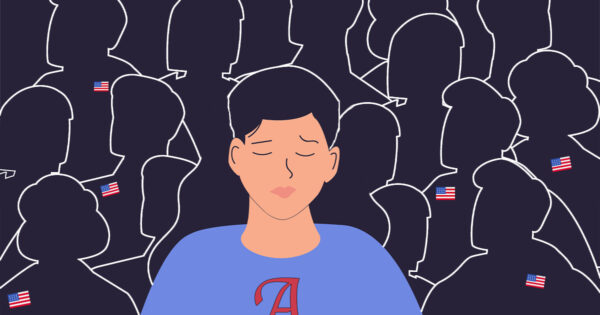A lot happened since you last heard from me. I moved to Omaha and started anew at Immigrant Legal Center – an ever-growing nonprofit with offices across Nebraska.
As with any major change, there are some drawbacks. There are the heaps of uncollected garbage outside my Midtown apartment (it’s part of a larger problem). But when I’m not dodging filth, I am taking in the freshness of my new workplace. There’s yoga in the basement and rainbow triangles on doors. In conference rooms, I often find people who look like me – young, female, and/or people of color – running the show.

Moreover, we get philosophical about leadership. We recently discussed this article on psychological safety lending itself to Google’s success. Psychological safety exists when people feel secure enough to let down their guard. When the fear of looking stupid goes away, people are more likely to take risks and voice their opinions.
This is good, because taking risks and speaking up can spark change and foster innovation.
This notion dovetails into other thoughts. Lately, as I walk my dog through cascades of overturned trash, my mind wanders to Scottsbluff and the three years I spent in my hometown. Not only do I recall the cleaner sidewalks, but I also remember the amazing civic happenings while I lived there. I realize now that so many of them were possible, in large part, because of psychological safety.
Some healthy dialogues between Scottsbluffians and their elected officials come to mind.
When the city started looking at new redevelopment, I and others were unafraid to take the podium. We spoke frankly about southeast Scottsbluff’s reputation as the dirty, dangerous, ethnic neighborhood and how the city’s past failures to meaningfully connect with its residents contributed to that perception. The city, in turn, organized a neighborhood steering committee that still maintains a back-and-forth between residents and the council. It wouldn’t have happened unless people felt safe looking at their local officials in the eye and the officials were willing to listen without judgment.
Another time, the city tried to speed through a land sale to a concrete plant but the land sat across from Meadowlark Hearth, an organic seed farm that supplies produce to residents, restaurants, and food banks. There was some crunchy hell to pay. People protested and petitioned, and, again, the other sides listened. Councilmembers visited the farm. The mayor sat down to a dinner of grilled organic kohlrabi. The concrete company invited farmers to a nearby plant so they could see its dust-abatement methods. In the end, the land sale went through and a concrete plant went up. Some feelings were still hurt, but it would have been far worse had people not shown up to pump the city’s brakes.
Psychological safety also paved the way for some moments of social curiosity and problem-solving.
For example, one Saturday, a low rumble rattled the windows and floorboards of my tiny bungalow. I was certain a train had derailed (again) or the sugar factory blew up (again). Facebook grew alight with posts of “Who else heard that?”
With the local news silent on the matter, people took it upon themselves to find the cause. In small-town style, my friends turned to the police scanner and posted what they heard. Eventually, we pieced together the very anticlimactic, painfully binarist truth – the boom was just a massive gender-reveal bomb.
Another time, I got calls at my office about the acrid dog poop smell coming from the sugar factory’s retention pond. Even a government employee called me. As if I knew what to do about the calls she was receiving. Overnight, I became an unofficial spokesperson against dog poop smells. I rolled up my sleeves, delved into some public records, then posted the helpful bits on AstridSleeps.com and its corresponding Facebook page (106 followers and counting!).
Did I get an angry phone call from the factory’s legal department? Sure. Was I reminded that loose lips sink trade secret ships? Kind of. I am still running AstridSleeps.com, though, and I am grateful the people of Scottsbluff feel safe enough to ask the pressing questions its media doesn’t, and then works together – be it through phone calls or police scanners or social media – to fill those informational vacuums.
The greatest examples of psychological safety in Scottsbluff, however, probably came from Panhandle Equality – the area’s LGBTQ advocacy group. There may be an old guard naysaying and tsk-tsking the group’s parade floats and county fair booths, but for the most part, Scottsbluff is an accepting community. Absent much judgment, the group is a growing force.
After the Orlando nightclub shooting, PE held a vigil. After a trans youth committed suicide, PE quickly organized a community meeting on bullying. The area finally has its own pride celebration because of PE – not to mention LGBT-friendly karaoke, bowling, and picnics.
As we move through Pride Month, let’s think about our relative psychological safety and what we can do – in our homes, in our workplaces, and in our communities – to help others feel safe enough to speak up, ask questions, and dance as though no one is watching. If Google and Panhandle Equality are any indications, more psychological safety equals more rainbows everywhere.
Astrid Munn is the Child and Family Managing Attorney at Immigrant Legal Center in Omaha. A native of Scottsbluff, Astrid began her career as a journalist before earning her law degree from Washington University in St. Louis. She previously practiced immigration law in the D.C./Baltimore area and personal injury law in Western Nebraska.
For more Civic Nebraska Writers Group columns, click here.




